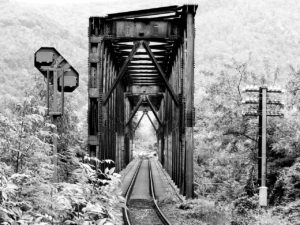 I’m kicking off 2019 in a new-for-me spirit of claiming my voice and my space in the parts of the ongoing literary conversation which I find of interest.
I’m kicking off 2019 in a new-for-me spirit of claiming my voice and my space in the parts of the ongoing literary conversation which I find of interest.
In August 2018, Broken Pencil magazine interviewed me for a cover story article on “The New Noir,” written by Leah Coppella.
Very little of my interview ended up in the finished piece published in their Sept. issue (#81), so I thought I’d post my full answers here.
BP: How would you personally define noir?
SGW: I think of noir as the genre of bad and/or sad people making bad choices. Noir is the story of the loser on a metaphorical and often literal journey from a situation that’s salvageable to a point of no return—and beyond—because of an irredeemable choice. There’s an inevitability to that journey, too, that’s painfully poignant because we know there are always other choices, but the loser’s worldview simply cannot allow for them. The familiarity of their world far outweighs the risk of hope. This, above all else, makes them a loser—as in, a person who loses whatever is important to them.
BP: How has small press embraced noir?
SGW: I mean, I haven’t read everything out there in the world of small press noir, but I’d guess they choose to specialize in noir stories because it’s as much a passion as a business model. So embrace might not be quite the right descriptor, mostly because the connotation is of late-coming. I’d bet the owners were already lovers and connoisseurs of noir who decided to share that love, with equally stricken readers, and in the hopes of converting more of the faithful. Publishing is a tough game. If you’re going to toil, why not do it for something meaningful, right?
BP: What do you think attracts readers to noir as a genre?
SGW: Why do readers like any of the genres they read? They want to connect with the story, the characters, the historical significance…something. Perhaps noir appeals to the same part of people that has them fascinated by car wrecks and others’ ills. There but for the grace of God and all that. It’s as much human nature to help people in trouble as it is to feel relief that you were spared their woe. So maybe noir indulges the latter without actively hurting anyone.
Speaking for me, I like the dark poetry of noir. There is satisfaction in reading (or watching) the story of someone striving for something they’ll never attain. Noir forces me to consider my own stand: do I keep trying? Or do I throw in the towel? It’s a bleak questioning, sure, but I think it’s necessary.
BP: Do you think noir is becoming more diverse?
SGW: What do you mean when you say more diverse? That implies there are degrees of diversity. I don’t agree with that. Diversity isn’t on a spectrum. It is the spectrum. It’s the whole point. It’s present or it isn’t. What’s missing from many of these conversations is inclusion. Inclusion is the tool by which you create diversity.
From where I stand, noir looks pretty much the same as any other genre in publishing. That says more about industry gatekeepers than it does about any specific genre. We ought to be asking, Which writers are getting published? Which communities are being asked to submit? Who reads the slush piles? What does a good story mean? For whom? According to whom? There are so many flex points where inclusion would make a substantial difference in creating a diversified range of published titles and in creating space for historically marginalized people to contribute. That’s true for any genre.
BP: Do you think that noir entices people to explore sensitive topics such as poverty and/or corruption?
SGW: Absolutely, though it’s incongruous to see entices being used in conjunction with noir. It’s not a particularly pretty genre, is it? And it’s not meant to be. So, yeah, it makes sense that noir stories deal with topics and themes related to poverty, corruption, classism, economic inequality, sexual exploitation, discrimination, racialized and sexualized violence, etc. The exploration happens, as with any meaningful literature, when the reader is drawn into the characters’ conundrums and moral ambiguities. Real life is far from straightforward. When noir best explores these topics, I think it’s using the grit and darkness of its tropes to build a mirror that transforms into a magnifying glass.
BP: Do you think noir is resurging? If so, do you think it has anything to do with the current cultural climate?
SGW: I don’t think noir ever waned. I readily admit I’m the lamest noir lover you’ll ever find, but I’m pretty sure there’ve been noir stories published non-stop for the past 80 years. (Sorry, no receipts.) As with anything human beings create, noir has morphed in many ways, including the texture and shape of its narratives as well as the nature of its storytellers. But really, isn’t our current cultural climate a direct result of countercultural art (including noir) bringing unpleasant topics and circumstances to the centre from the margins? Noir is a broader and more complex genre than its post-war origins, but as far as I can tell, it’s still surging.

